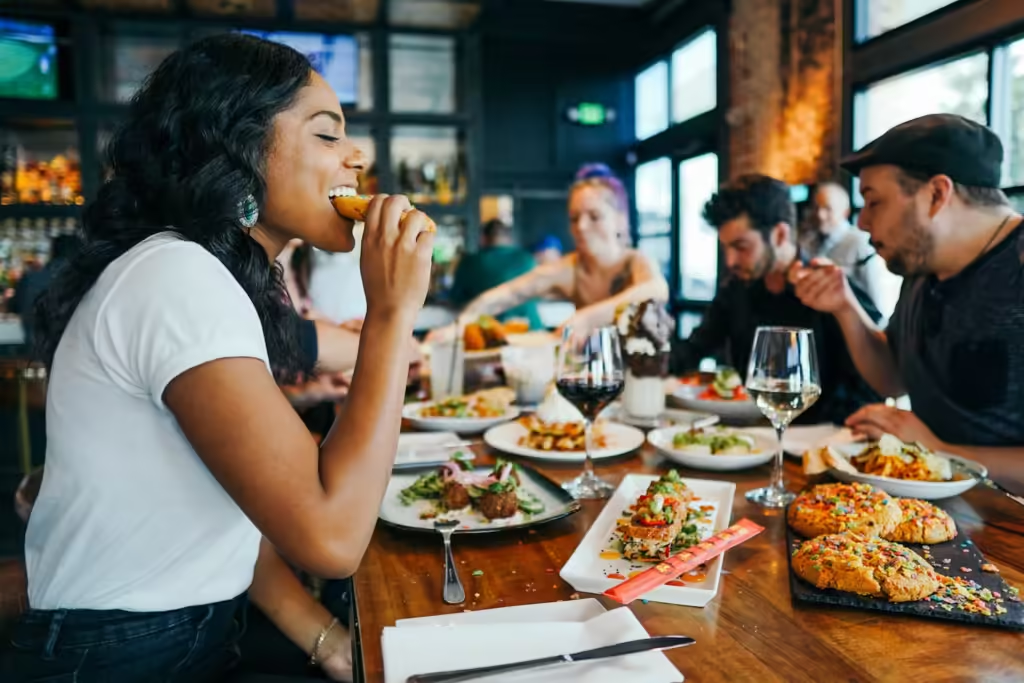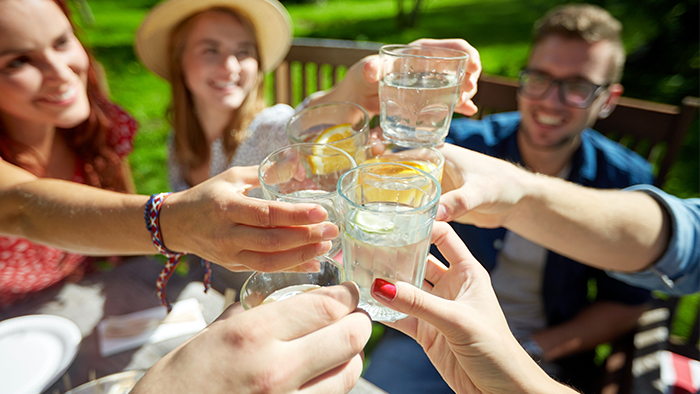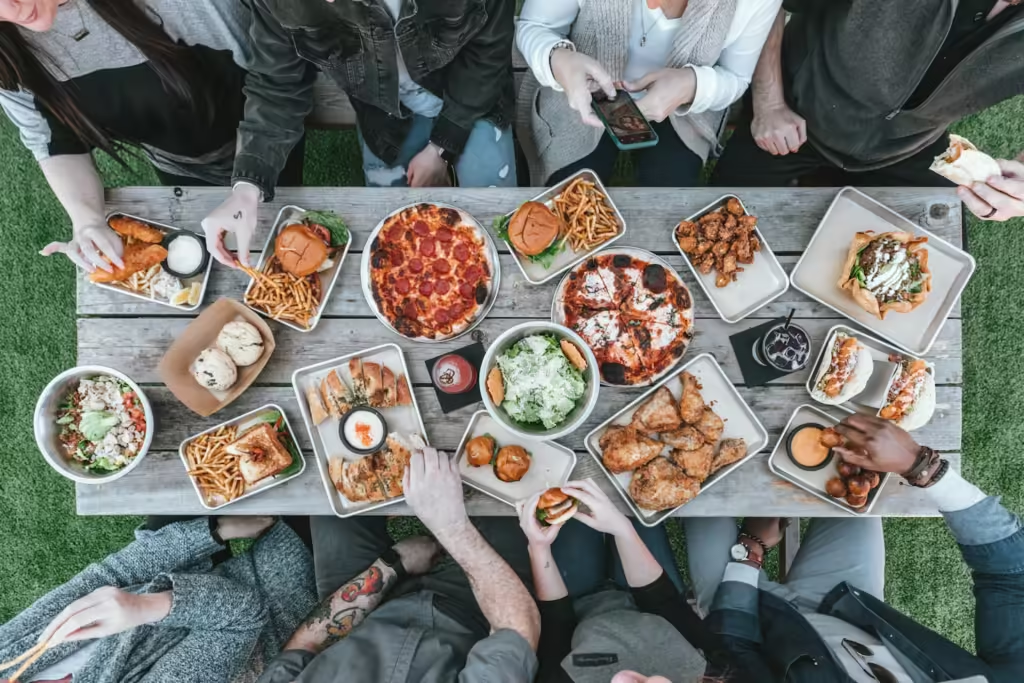Introductions
Many of us find ourselves contemplating the best way to improve our digestion and well-being after a delicious meal. Do you prefer to lie down and unwind, do some exercise, or savor a sweet treat? In this extensive article, we will investigate the following: After eating, what is the best thing to do? You will be able to make informed decisions regarding your post-meal routines armed with knowledge and expert guidance. So, let’s get started and learn how to have a healthier and more satisfying meal after. This is the small introduction of Now you have some idea What is the best thing to do after eating?

What is the Best Thing to Do After Eating?
What is the best thing to do after eating? It’s essential to address the primary concern right away: What is the best thing to do after eating? The answer may surprise you, as there isn’t a one-size-fits-all solution. Different individuals have unique needs and preferences, and various factors can influence the optimal post-meal routine. However, there are several common practices that are widely recommended by experts to promote digestion and overall well-being. Let’s explore them in detail:
1. Take a Leisurely Stroll
One of the simplest and most effective activities to engage in after a meal is taking a leisurely stroll. Walking helps stimulate digestion by promoting the movement of food through the digestive tract. It also aids in preventing bloating and indigestion, making it an excellent post-meal habit. Aim for a gentle walk of around 10 to 15 minutes, preferably in a peaceful environment like a park or garden.
2. Engage in Light Physical Activity
Engaging in light physical activity after eating can have numerous benefits. Activities such as stretching, yoga, or gentle aerobic exercises can help enhance digestion, boost metabolism, and prevent post-meal lethargy. However, it’s important to avoid intense workouts or rigorous exercise immediately after a meal, as it may divert blood flow from the digestive system and interfere with proper digestion.
3. Practice Mindful Relaxation
In today’s fast-paced world, stress has become a common factor that negatively impacts digestion. Engaging in mindful relaxation techniques after eating can help counteract stress and promote optimal digestion. Try deep breathing exercises, meditation, or simply sitting in a quiet and serene environment to relax your mind and body. Mindful relaxation not only aids in digestion but also enhances overall well-being.

4. Stay Upright
Maintaining an upright posture after eating is crucial for proper digestion. When we slouch or lie down immediately after a meal, it can compress the digestive organs and hinder the digestion process. Instead, sit upright or stand for at least 30 minutes after eating to allow gravity to assist in moving food through the digestive system.
5. Avoid Smoking
It’s a well-known fact that smoking is detrimental to health, but did you know that it can also disrupt digestion? Smoking after a meal can lead to the production of excessive stomach acid, which can result in heartburn and indigestion. Therefore, it’s best to avoid smoking altogether, especially in the immediate aftermath of a meal. This is also best thing to do after eating.
6. Hydrate Wisely
Hydration is essential for maintaining a healthy body and aiding in digestion. However, it’s crucial to choose the timing of your water consumption wisely. While it’s important to stay hydrated throughout the day, drinking excessive amounts of water immediately after a meal can dilute stomach acid and impair digestion. Instead, sip water moderately during and after your meal to support the digestive process.

7. Indulge in Herbal Tea
After a satisfying meal, a cup of herbal tea can serve as a soothing digestive aid. Certain herbal teas, such as peppermint, chamomile, or ginger tea, are known for their digestive properties. They can help relieve bloating, indigestion, and stomach discomfort. Additionally, the warmth of herbal tea can promote relaxation, aiding in the overall digestive process. Now you have some idea What is the best thing to do after eating
8. Enjoy a Small Dessert
Who doesn’t love a sweet treat after a delicious meal? While indulging in a small dessert can be satisfying, it’s important to choose wisely and consume in moderation. Opt for healthier dessert options like fruit salads, dark chocolate, or yogurt with berries. These choices provide essential nutrients and can satisfy your sweet tooth without overwhelming your digestive system. Now you have some idea What is the best thing to do after eating?
9. Practice Portion Control
Maintaining a healthy and balanced diet is key to optimal digestion. Practicing portion control is essential to avoid overeating, which can lead to indigestion and discomfort. Take time to savor your meal and listen to your body’s cues of satiety. By being mindful of portion sizes, you can promote better digestion and prevent post-meal sluggishness.
10. Incorporate Digestive Enzymes
For individuals experiencing chronic digestive issues, incorporating digestive enzyme supplements into their routine might be beneficial. These enzymes aid in breaking down macronutrients, improving digestion, and alleviating symptoms such as bloating and gas. Consult with a healthcare professional to determine the right digestive enzyme supplement for your specific needs.
11. Chew Thoroughly
The simple act of chewing plays a crucial role in digestion. Thoroughly chewing your food allows for better breakdown and absorption of nutrients. It also signals your body to release digestive enzymes, facilitating the digestion process. So, slow down, savor each bite, and chew your food thoroughly for optimal digestion.
12. Embrace Probiotics
Probiotics are beneficial bacteria that promote a healthy gut microbiome. Consuming probiotic-rich foods or supplements after a meal can enhance digestion and support overall gut health. Yogurt, kefir, sauerkraut, and kimchi are excellent sources of natural probiotics. Alternatively, probiotic supplements are widely available and can be included in your post-meal routine. Now you have some idea What is the best thing to do after eating?
13. Try Acupressure or Acupuncture
Acupressure and acupuncture are ancient healing techniques rooted in Traditional Chinese Medicine. These practices involve applying pressure or inserting thin needles into specific points on the body to stimulate various functions, including digestion. Exploring acupressure or acupuncture as part of your post-meal routine may help alleviate digestive issues and promote well-being.

14. Practice Food Combining
Food combining is a dietary approach that involves consuming certain foods together to optimize digestion. The idea behind food combining is that different food groups require different digestive enzymes, and consuming incompatible combinations can lead to digestive disturbances. While the evidence supporting food combining is mixed, some individuals find it helpful in preventing discomfort and improving digestion. Experiment with food combining principles and observe how your body responds.
15. Listen to Soothing Music
Music has a profound impact on our emotions and overall well-being. Listening to soothing music while digesting your meal can help relax your mind and body, promoting optimal digestion. Choose soft melodies or instrumental tunes to create a calming atmosphere. Dim the lights, sit back, and let the music enhance your post-meal relaxation. if you want a known about more What is the best thing to do after eating?

Conclusion
Consider your personal preferences, health objectives, and the type of meal you consumed when deciding what to do next. Each option has its own set of advantages, whether you decide to go for a leisurely stroll, do some light exercise, use mindful relaxation techniques, or connect with nature. Find a post-meal routine that meets your needs and remember to listen to your body. You can improve digestion, improve well-being, and cultivate a healthier lifestyle by adopting healthy and mindful practices after eating. Now you have some idea What is the best thing to do after eating?
FAQ
Q1: Is it okay to lie down immediately after eating?
Lying down immediately after eating is generally discouraged, as it can lead to discomfort and indigestion. It is recommended to wait at least 2-3 hours after a meal before lying down to allow for proper digestion. If you must recline, elevate your upper body with a pillow to aid digestion.
Q2: Can I drink water right after a meal?
While it’s essential to stay hydrated, drinking excessive water immediately after a meal can dilute stomach acid and hinder the digestion process. It is advisable to wait 30 minutes to 1 hour after eating before drinking water. Sipping water during a meal is generally acceptable and can aid in the digestion of food.
Q3: Should I brush my teeth immediately after eating?
It is best to wait at least 30 minutes after a meal before brushing your teeth. Acidic foods can temporarily weaken tooth enamel, and brushing immediately after eating can lead to enamel erosion. Rinse your mouth with water or chew sugar-free gum to stimulate saliva production, which helps neutralize acids.


Pingback: How Long Does Pre-Workout last? & Best Way To Take It